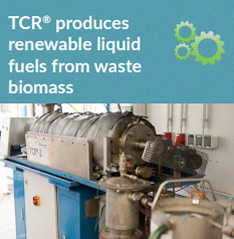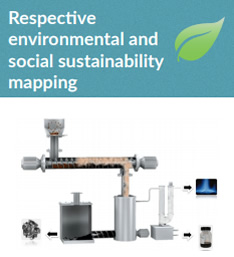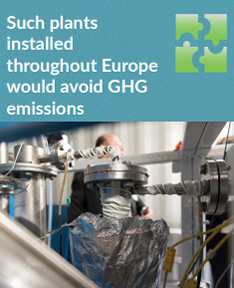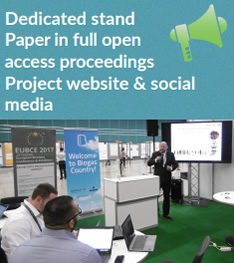 |
| |
The TO-SYN-FUEL consortium is delighted
to introduce its first newsletter edition.
You can learn more about our project, upcoming news and events by visiting www.tosynfuel.eu

|
|
In December 2016 the European Commission has released its proposal for the RED II, the Renewable Energy Directive for the post 2020 period. This proposal introduces a gradual phase-out of conventional biofuels and sets a minimum target for advanced biofuels (produced from non food/feed sources) for transport.
Imagine technologies integrated in a plant that could take waste biomass and convert it into liquids indistinguishable from fossil fuel diesel and fossil fuel petrol. Imagine if this conversion was achieved in hours instead of aeons. The TO-SYN-FUEL project is designed to demonstrate a process than can achieve exactly this, thus meeting the European Commission’s call to action. The TO-SYN-FUEL consortium, composed of 12 SME, industrial, and scientific partners and co-ordinated by Fraunhofer UMSICHT, will together build up, operate and demonstrate the production of Synthetic Fuels and Green Hydrogen from waste biomass.
Building and extending from previous framework funding, the project is designed to set the benchmark for future sustainable development and growth within Europe and will provide a real example to the rest of the world of how sustainable energy, economic, social and environmental needs can successfully be addressed.
Prof. Dr. Andreas Hornung, Director of Fraunhofer UMSICHT in Sulzbach-Rosenberg and Chair of the Project Board: “We are happy to start this project which will be a major change for the behaviour in the future use of green fuels and sustainable fuels. With its integrated demonstrator plant, the project will show how simple it is to generate green fuels from biogenic residues and wastes, and also to deliver hydrogen and syngas for future synthesis”.
|

|
|
The TO-SYN-FUEL process is built around thermo-catalytic reforming (TCR®) technology developed by Fraunhofer UMSICHT. TCR® produces renewable liquid fuels from waste biomass such as sewage sludge. The TCR® technology will be implemented in a new integrated process to convert a broad range of residual biomass into three main products: H2-rich synthesis gas, biochar and liquid bio-oil. By integrating high pressure hydrodeoxygenation (HDO) and conventional refining processes, the bio-oil can be upgraded to green fuels that are ready to be used directly in internal combustion engines. These fuels comply with European standards for gasoline and diesel EN228 and EN590, and have already been demonstrated at pilot scale.
|

|
|
To demonstrate and validate the technical and commercial viability of this integrated approach, the project will combine in one plant TCR®, HDO and pressure swing adsorption (PSA) technologies. In addition, their respective environmental and social sustainability mapping will be included. The main objective is to create TCR® bio-oil, upgrade it into HDO bio-oil and to separate the produced H2, creating a new value chain. The HDO unit will be designed by the project partner VTS and will be the part of the plant where the bio-oil is upgraded. The bio-oil feedstock from the TCR® will be fed with hydrogen from the PSA unit into a fixed bed reactor system. There, reactions over the catalysts will occur, which will result in the removal of heteroatoms of the bio-oil such as sulphur, nitrogen and oxygen, increasing the quality of the oil. The process will run with a surplus of hydrogen. With respect to the economic efficiency and the environment, this excess will be recycled through the PSA unit, designed by the project partner Hygear.
|

|
|
Within the project biogenic residues or organic residues are converted into useful, inexpensive and high-performance synthetic fuels on a demonstration scale. The scale up of one hundred of such plants installed throughout Europe would avoid GHG emissions equivalent to five million people per year and divert millions of tonnes of organic wastes from landfill to sustainable biofuel production. As a result, the TO-SYN-FUEL approach opens up long-term opportunities to convert organic waste into renewable fuels and to directly implement these fuels into existing petroleum infrastructure.
Dr.-Ing. Robert Daschner, Head of the Renewable Energy Department at Fraunhofer UMSICHT and Project Management Officer: “In this project we want to produce green diesel from waste, which in this particular case will be sewage sludge. In the next four years we will build-up, operate and demonstrate the technology and by the end of the project we want to have a business case for green fuels in order to support the targets of the European Commission”.
|

|
|
A dedicated stand of the project will join the Exhibition Area of the 26th European Biomass Conference & Exhibition (EUBCE), in May 2018 in Copenhagen. The EUBCE combines one of the world’s leading R&D conferences with an international exhibition, and represents the leading platform for the collection, exchange and dissemination of scientific know-how in the field of biomass. The project will be also presented during the EUBCE Conference Programme and the related presentation paper will be included in the conference proceedings. The EUBCE Conference Proceedings have a full access policy. Therefore, all papers will be fully searchable and citable online as soon as they are published. The TO-SYN-FUEL project was presented at the EUBCE 2017 as well (on Tuesday 13th June 2017 at the exhibition area). Follow the project development and news by visiting its website, www.tosynfuel.eu, and related social media.
|

|
|
A database of target stakeholders related to the topics of the project is planned to be defined, managed and regularly updated. Single or grouped stakeholders from any sector of industry, research and innovation of the clean energy, particularly involved in circular economy and low-carbon economy initiatives and interested in sharing and receiving further information on the TO-SYN-FUEL project activities and results, are invited to register themselves through the Stakeholder Registration Form. You are kindly encouraged to inform other potentially interested stakeholders about the opportunity to join the TO-SYN-FUEL community through the simple registration described here above. Keep in touch with the project to learn about the development of best practices regarding market implementation, commercialization and deployment of new technologies and processes.
|

The consortium with 12 partner organisations has brought together some of the leading researchers, industrial technology providers and renewable energy experts from across Europe, in a collaborative, committed and dedicated research effort to deliver the overarching ambition. Partners include: Engie Services Netherlands NV, HyGear Technology and Services BV, Slibverwerking Noord-Brabant NV (The Netherlands), Fraunhofer UMSICHT, Verfahrenstechnik Schwedt GmbH, Susteen Technologies GmbH (Germany), Alma Mater Studiorum – University of Bologna, ENI SpA, ETA–Florence Renewable Energies (Italy), University of Birmingham, WRG Europe Ltd (UK) and LEITAT (Spain).
The project has a total duration of 48 months from May 2017 to April 2021 and will be funded by the European Union under the Horizon 2020 programme.

Contact Point Fraunhofer UMSICHT:
Dr.-Ing. Robert Daschner, Project Management Team
Email: robert.daschner@umsicht.fraunhofer.de, phone: +49 (0) 9661 908-410
Contact Point ETA-Florence:
Ing. Stefano Capaccioli, Project Dissemination Team
Email: stefano.capaccioli@etaflorence.it, phone: +39 055 5002174.

|
|
This project has received funding from the European Union’s Horizon 2020 research and innovation programme under grant agreement No 745749.
|
Disclaimer
The content of this newsletter cannot be considered as the European Commission’s official position and neither the European Commission, TO-SYN-FUEL project consortium nor any person acting on behalf of these organisations is responsible for the use which might be made of it. Although TO-SYN-FUEL project endeavours to deliver a high level of service, no guarantee can be given on the correctness or completeness of the content of this newsletter and neither the European Commission, TO-SYN-FUEL project consortium are responsible or may be held accountable for any loss suffered as a result of reliance upon the content of this newsletter.
|
|
 Printable version
Printable version
|
|
|
|
|
|
| |
|
